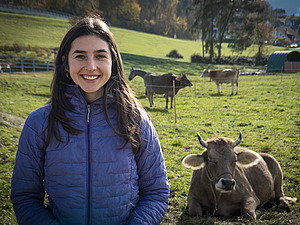"Ultimately, it always comes down to communication, trust and closeness"
Voices on climate
Jasmin Hufschmid has been climate project manager at Bio Suisse since 2022. She is committed to ensuring that sustainability in agriculture is considered holistically – beyond just climate protection. (Photo: Jürg Vollmer)
Jasmin Hufschmid has been climate project manager at Bio Suisse, the umbrella organisation for Swiss organic farmers, since 2022. She is committed to ensuring that sustainability in agriculture is considered holistically – beyond just climate protection. She previously studied environmental engineering at the ZHAW in Wädenswil, specialising in organic farming and horticulture.
Why are you involved in climate issues and organic farming?
I have been interested in food for a long time, but in the past, I was more focused on health aspects. As my awareness of the challenges of our time has grown, my view of the big picture has broadened. Through my work, I try to help shape the agricultural and food system in a future-oriented way.
How do people on farms feel about climate change?
It is an issue for many farms, as they work with nature on a daily basis and feel the changing climatic conditions, both the positive and negative aspects, in their region. Many farms focus on overall sustainability, such as closed cycles and the promotion of biodiversity, as well as the climate. At Bio Suisse, we ensure that we always integrate the issue of climate change into our overall sustainability approach.
As a young woman, what is it like for you to work in an industry that is still predominantly male and dominated by other generations?
I am convinced that diversity is a key factor in working effectively on complex challenges such as climate change. Equality is naturally very important to me – and I have been pleasantly surprised time and again. In the working groups and committees, I am involved in, we usually have a very mixed gender composition.
As a young person, however, some people expect a lot from you in terms of the future and solving sustainability problems. At the same time, others don't take you entirely seriously. Communication, shared responsibility, and a hands-on approach can help here!
Bio Suisse consistently integrates the interface between practice and research into its climate work. How well is this currently working in the climate sector in Switzerland?
Cooperation between practice and research is now clearly visible and well-networked in many Swiss climate projects. Ultimately, it always comes down to communication, trust and proximity. It is very valuable when researchers – as at FiBL – are in contact with agricultural practice or the food sector. A good example of this interaction is the new fact sheet "Cows and Climate". The topic was repeatedly brought up with Bio Suisse by practitioners. We then worked with FiBL to develop the fact sheet with feedback from practitioners, processors and politicians. Now everyone is enthusiastic about the fact sheet.
What role do networks play for you?
At Bio Suisse, I am solely responsible for climate issues. This is also the case in many other organisations and associations. This makes it all the more important to have a strong network that extends beyond organic farming and even beyond national borders.
This way, you can see how many people are working on similar issues, asking the same questions and learning from each other. It's very inspiring and encouraging.
Is there a project or initiative that you are particularly proud of – something that makes you feel optimistic?
I am very pleased about the strategic cooperation with IP Suisse (Association of Integrated Farmers in Switzerland, editor's note) in the area of climate. Together, we have further developed a system that now allows us to make climate performance visible on farms. We are not competing in this area, but want to work together to create added value for our farms.
If you could give young people who want to work in the organic sector or climate protection something to take away with them today, what would it be?
Reflect on your projects and be brave enough to let them go when the time is right. And let go of black-and-white thinking; the solutions often lie somewhere in between.
Work together and build networks in which different people learn from each other, and support and sustain each other.
Pay attention to your own sustainability: take time to pause and reflect on your own work in the global context. And stay connected to yourself, nature and the earth.
Interview: Lin Bautze, FiBL




